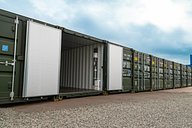According to the UK Self Storage Association (SSA), there are more than 2,200 self storage sites and approximately 55.5 million sq ft of self storage space across the country.
Although the figures may seem exaggerated at first, there is good reason for such a resounding number.
The current housing crisis is forcing home-hunters to opt for smaller properties, meaning people have less room to fit all their belongings. In turn, this is leading house buyers and tenants to increasingly look for storage space that can accommodate their items.
Likewise, managing a self storage container business is a relatively stress-free process. In fact, as opposed to, say, a restaurant or bar, running a self storage company on a day-to-day basis comes with fewer demands.
With container unit rentals, you would be renting individual shipping containers to customers and businesses. Bear in mind that this business model can be a cost-effective way of taking your first steps in the self storage sector.
So, if self storage sounds like a world that’s worth exploring, here is how you can venture into the sector and set up your own successful business.

Planning a Container Storage Venture
Container storage market analysis
Before you start a storage facility business, it is wise to have a closer look at the market situation. This will give you the chance to assess competition, check out what other businesses are doing, identify opportunities, and create some tailor-made solutions for your customers.
As mentioned, the current climate is playing an important role in people’s need for storage space. People are dealing with a wide range of challenges, from a volatile economy to a competitive housing market. This means that more and more home hunters are settling for smaller properties, whether because they are more affordable or are the only available options.
With tinier homes comes less space, spurring more homeowners and tenants to seek self storage solutions for belongings that won’t fit in their own rooms. Likewise, companies might have to resort to smaller, cosier sites that aren’t large enough to host all their equipment.
Based on the current landscape, you can determine what offerings might suit your customers best. Whether it is advantageous sign-up costs for new clients or assisted services to provide people with a more personalised experience, having a careful look at the current market situation can help you come up with unique services that set you apart from other competitors within the industry.
Regulations for container use
To ensure the safety and structural integrity of your business, it is important to be aware of specific regulations for container use.
For example, you will need to obtain licences to operate a self storage organisation, including permits for site improvements and for installing containers on your property and land.
You may also need to be aware of environmental regulations to minimise your impact on your surroundings, from waste disposal and water management to handling hazardous materials.
Make sure to check out all the laws, regulations, and small print before you kickstart your business – it can spare you from avoidable headaches as you roll out your plan.

Setting up a Container Storage Site
Conducted all your research? Well, you can slowly begin to turn your plans into reality.
The location is no doubt an important factor. Ideally, you want to choose a place that’s easy to access and – if possible – visible from main roads, as this will help you expand your brand awareness and make your facility straightforward to get to. Although, some of our self storage customers are located in more remote areas and still experience a great level of success with customer sign-ups.
However, as with most businesses and buildings, you will need to be granted planning permission to set up your self storage company. Whether you’re granted permission will depend on various aspects, including the location of the land, the size and design of your self storage facility, and so on.
Once you get the go-ahead, you will need to prepare the site for your shipping container self storage business, from clearing the land to levelling the ground. In fact, an uneven surface might affect the ability to open and close the doors of your storage containers, creating an avoidable issue.
It is also important to get hold of shipping containers that are durable and secure – this will help you provide higher quality service and keep your customers happy.
When it comes to ordering reliable containers, Cleveland Containers is always here to give you a hand. We stock a wide range of sizes, so you can offer your clients a selection of storage dimensions to suit their specific needs.
If you are a farmer exploring new business opportunities, you may want to read our ‘farm diversification’ blog. It will show how adding a self storage element to your agricultural activity can maximise unused farmland and favour your finances.
.jpg)
Container Storage Operations
Branding a container business
Once you’ve got your container self storage business up and running, you will need to find ways to stand out from the crowd. As mentioned, there are a fair few businesses out there offering self storage space – so what can you do to get customers to choose you?
As with any other company, make sure to develop your own brand identity that reflects what you are all about. If your target audience is commercial business owners who need room for their equipment and tools, ensure that your website and marketing efforts make this clear.
Also, don’t shy away from promoting what truly makes you special and sets you apart from other companies in the self storage sphere. Do you provide exceptional security services? Do you have convenient access options? Do you offer personalised assistance? Shout about the good stuff you do and highlight how your business can make people’s lives easier.
Managing inventory
Keeping your inventory in check is important for ensuring the smooth, efficient operation of your self storage business.
It’s worth organising your storage layout in a way that’s easy to navigate both for yourself and your customers. For example, you could divide specific sections of your facility based on the size or type of containers they are hosting so that people know exactly where to go to access their allocated storage space. Try to leave plenty of access for cars with adequate room for turning circles. There could even be scope to charge more for ‘premium’ units closer to the entrance.

Financing and Profiting from Containers
So, what now? If you have set your heart on starting a storage business but are concerned about how much it will cost you, feel free to get in touch.
We have created BOX+, a complete solution that gives you all the support and information you need to launch your self storage company.
In addition, we’ve also partnered with Approved Business Finance, a leading finance broker, to help you make the initial purchase more affordable. Explore your financing options here and receive a free, no-obligation quote which won’t affect your credit score.
Our expert team is always on hand to answer any questions you may have. Through detailed plans and site designs, we are dedicated to creating the right business model to help you maximise your return on investment.
Need our help?
Talk to us about your container project today...
You may also be interested in...

How Much Does It Really Cost to Start a Self Storage Business?
Launching a self storage business can be a highly rewarding venture, offering steady growth and reliable returns, but how much does it cost to get started?

Chatterbox #16: Optimising Self Storage Branding
Elevate your self storage business inside and out, with the transformative power of branding.

How to Gain Planning Permission for a Self Storage Site
Learn how to obtain the necessary planning permission for your self storage site with these essential tips.





0 Comment
Please leave a comment using the form below